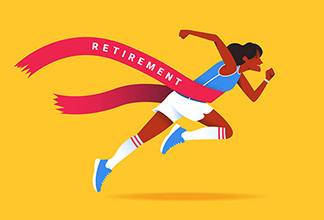One Big Trend in Pandemic Weddings? Big Savings
Written by The Inspired Investor Team
Published on June 23, 2021
minute read
Share:
Liz and Evan are perched on a sofa, smiling nervously as a wedding planner describes their perfect day: a cocktail hour, rustic trolleys and late-night snacks from a hipster food truck. Next, a realtor reminds the couple about the charming four-bedroom home they've fallen in love with—the one with a sprawling backyard and freshly renovated kitchen. With a budget of US$35,000, Liz and Evan can only pick one. Will they choose their dream wedding or their first home?
We won't spoil the ending, but that's the big question in every episode of Netflix's hit reality series Marriage or Mortgage. Choosing between a wedding and a home isn't easy, even for the more practical among us. For those choosing weddings, however, the picture has shifted a bit.
Weddings—loaded with traditions, family expectations and social-media-driven FOMO—exert a strong emotional pull, one reason couples are willing to splurge. Pre-pandemic, the average cost of a wedding in Canada was between $22,000 and $30,000, author Michelle Bilodeau told us in an interview. Along with co-author Karen Cleveland, Bilodeau wrote The New Wedding Book: A Guide to Ditching All the Rules, a handbook to practical, pressure-free weddings, which was published in April. The cost of weddings has doubled in the past 10 years, she adds, while the median annual family income has only increased 26 per cent. "Those two things just don't square up," says Bilodeau.
Nevertheless, weddings are an estimated $5-billion-a-year industry in Canada. In 2020, the Globe and Mail reported the industry lost $1.6 billion as pandemic-era physical distancing rules and other restrictions compelled couples to postpone their nuptials. Ontario alone saw 20,000 fewer marriages registered from January to September than it did during the same period in 2019—a 40-per-cent decrease—according to the province's registrar general.
Couples who are getting married during the pandemic are either trimming guest lists or getting creative with their wedding plans, according to media reports, which can lead to big savings.
Before COVID-19, wedding guest lists averaged 150 to 200 people, says Bilodeau; a 2017 Ipsos poll for Global News suggests that catering and wedding venues were the biggest expenses. Pandemic weddings are downright cozy by comparison: micro-weddings (20 or fewer guests), hybrid weddings (some guests attend, the rest watch online), pop-up weddings (where multiple couples take turns at the same venue), elopements and intimate backyard ceremonies. Now that these and other types of "mini-monies" are trending—if only out of necessity—couples are spending as little as $500 on their big day, a far cry from pre-pandemic budgets.
What should newlyweds do with the remaining cash? Invest in your life together, suggests Bilodeau. "Essentially, not blowing the bank on a wedding can allow couples to plan for their future five, 10 years down the road, instead of just planning for one eight-hour party."
Bilodeau predicts smaller weddings will stick around. "A lot of people are excited about doing a wedding that speaks more to who they are as a couple, as opposed to giving in to the pressure of doing things in a 'traditional' manner," she says. "The advent of the micro-wedding has really allowed couples to just spend money where they see the most value."
For those who find themselves with an unexpected nest egg, the next question becomes what to do with it. The answer will be different for everyone. (Read more on this in Pop Quiz: What Are You Saving For?)
For some, it may be about paying off debt. Clearing credit cards, student loans and other sources of debt allows you to go into your marriage "with a clean slate on both sides," says Bilodeau. For others, it may be about building an emergency fund or investing for a specific purpose, like home ownership, travel, retirement or a child's education. (Check out How Do You Use Your TFSA? 3 Personal Stories, Kids Are So Expensive – But Not In the Way I Expected and Want to Save for a House? Be Frugal, Healthy and Smart in the Kitchen for inspiration.)
When it comes to investing, one golden rule to keep in mind is the power of compound interest, or earning interest on interest, to help your money grow. And the longer your time horizon, the more significant the impact can be.
What would you choose? Marriage, mortgage… or something different altogether? Leave a comment* to share your thoughts in the Community.
Explore the Investing Academy for more investing resources.
RBC Direct Investing Inc. and Royal Bank of Canada are separate corporate entities which are affiliated. RBC Direct Investing Inc. is a wholly owned subsidiary of Royal Bank of Canada and is a Member of the Canadian Investment Regulatory Organization and the Canadian Investor Protection Fund. Royal Bank of Canada and certain of its issuers are related to RBC Direct Investing Inc. RBC Direct Investing Inc. does not provide investment advice or recommendations regarding the purchase or sale of any securities. Investors are responsible for their own investment decisions. RBC Direct Investing is a business name used by RBC Direct Investing Inc. ® / ™ Trademark(s) of Royal Bank of Canada. RBC and Royal Bank are registered trademarks of Royal Bank of Canada. Used under licence.
© Royal Bank of Canada 2025.
Any information, opinions or views provided in this document, including hyperlinks to the RBC Direct Investing Inc. website or the websites of its affiliates or third parties, are for your general information only, and are not intended to provide legal, investment, financial, accounting, tax or other professional advice. While information presented is believed to be factual and current, its accuracy is not guaranteed and it should not be regarded as a complete analysis of the subjects discussed. All expressions of opinion reflect the judgment of the author(s) as of the date of publication and are subject to change. No endorsement of any third parties or their advice, opinions, information, products or services is expressly given or implied by RBC Direct Investing Inc. or its affiliates. You should consult with your advisor before taking any action based upon the information contained in this document.
Furthermore, the products, services and securities referred to in this publication are only available in Canada and other jurisdictions where they may be legally offered for sale. Information available on the RBC Direct Investing website is intended for access by residents of Canada only, and should not be accessed from any jurisdiction outside Canada.
Explore More

Should I Invest or Pay Down My Mortgage?
Consider these four questions
minute read

As Many Head Back to the Office, Where Could Investors See Changes?
How returning to in-person work could affect a range of investments
minute read

Considering the FIRE Lifestyle? Here’s What Your Investments Might Look Like
We asked three people how they created financial independence and retired early
minute read
Inspired Investor brings you personal stories, timely information and expert insights to empower your investment decisions. Visit About Us to find out more.







